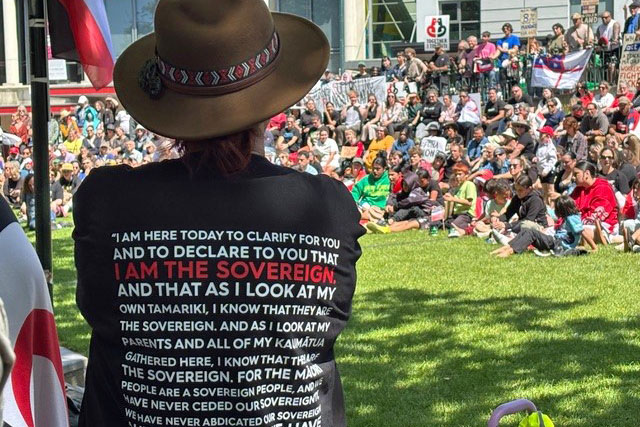
Each year on 6 February in Aotearoa New Zealand, we celebrate Waitangi Day commemorating the signing of Te Tiriti o Waitangi in 1840 between Māori rangatira (chiefs) and the Crown.
Admittedly, New Zealand has a history of ignoring Te Tiriti, but in the last 50 years particularly our governments and many institutions have worked with Māori to redress the injustices of the past — the injustices of colonisation. But last year, the Treaty was threatened by a minor political party in our coalition government. Without any discussion with Māori iwi (tribes), the party brought a Bill to parliament which will negate the Te Tiriti and enshrine ‘the Crown’ as the only reference for government decisions. We need to stop it.
Last November, I joined a lunch-time protest of tangata whenua (Māori ‘people of the land’) and tangata tiriti (Pākehā ‘people of the treaty’). It was mainly young Māori who fronted the stage and gave the speeches. We were reminded, in impressive oratory, of the stories, the character and meaning of Te Tiriti o Waitangi for our democracy and why the Bill is invidious to the relationships of our country. If the Bill was to go ahead it would demolish the Treaty as well as the gains made in reestablishing the intent of the Treaty in the last 50 years. These young Māori leaders were supported in waiata (song) and haka by their elders, whanāu (extended family) and iwi (tribal group) from around our region. At the gathering we sent off ‘our’ South Island Dunedin group to join up with the thousands in the national hīkoi (march of Māori and others from Northland to Parliament) in Wellington.
During the proceedings I noticed a woman slipping in the front of the crowd, trailed by a line of Kohanga Reo ‘chicks’ (pre-schoolers), who nestled in to watch the goings-on. These little ones are the next generation of bi-lingual Māori. They’re being steeped in Māori language, customs and values. On the stage were the fruits of ‘te Kohanga reo — the language nest’ movement. That initiative has hatched at least two generations of confident and articulate young Māori women and men, many of whom can switch effortlessly between te reo and English to express their deeply held truths.
As a former teacher, I felt in awe of the success of Māori education by Māori. At one time, Māori language was banned from schools so that generations lost the language. This is the renaissance. It gave weight to our Josephite 2019 Chapter commitment: “Let’s learn from tangata whenua and wholeheartedly support as neighbours their initiatives for recognition, agency and justice.” When Te Tiriti o Waitangi was signed in 1840, Māori, the people of the land, graciously agreed to allow colonists to live in the land with them but under British law. Māori did not agree to give up their own tina rangatiratanga (sovereignty). Now we must not allow this hospitable spirit and mana to be quashed by a disingenuous Bill dripping with entitlement.
Ann Gilroy rsj
